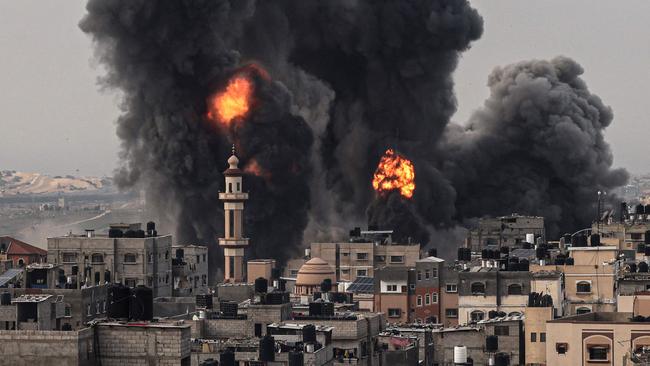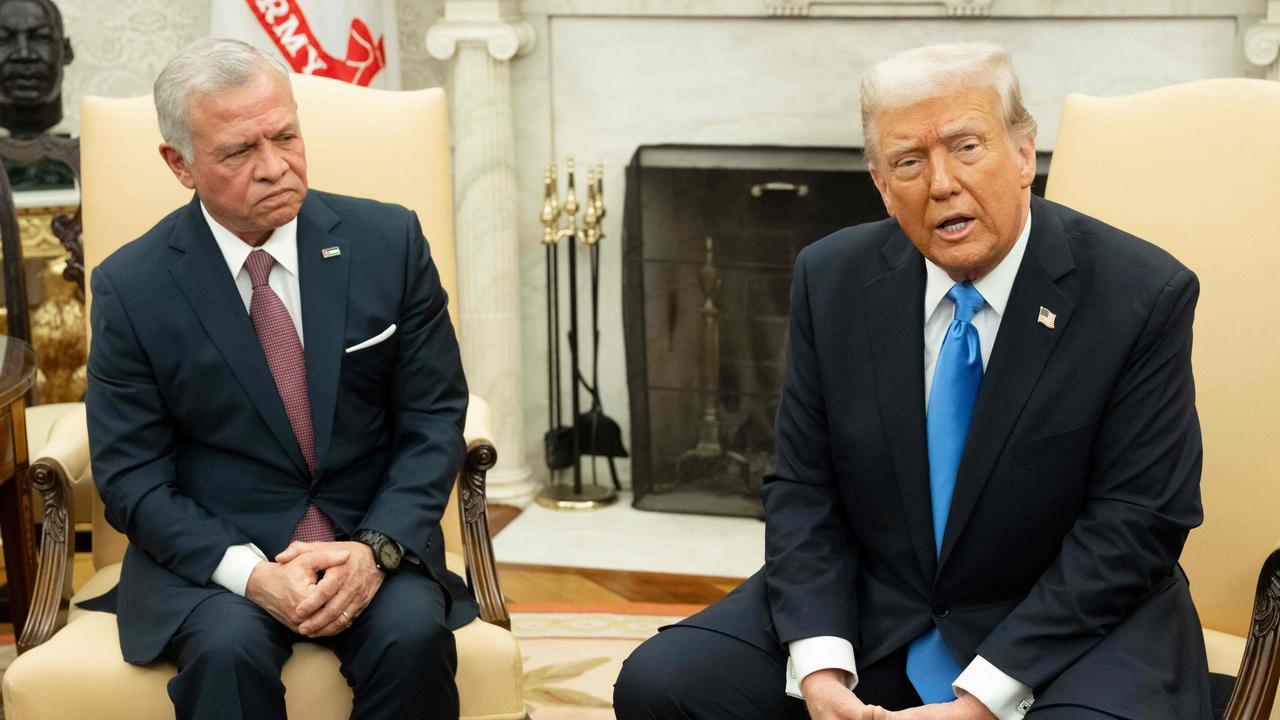Hamas rejection sours Israeli bid to revive hostage talks
Hamas has rejected an Israeli offer to stop fighting for one week in exchange for dozens of hostages.

Hamas has rejected an Israeli offer to stop fighting for one week in exchange for dozens of hostages, saying the group wouldn’t discuss releasing its Israeli captives until a ceasefire goes into effect, Egyptian officials said.
The head of Hamas’s political wing, Ismail Haniyeh, told intelligence officials in Cairo on Wednesday (Thursday AEDT) that he was there to obtain a ceasefire and more humanitarian aid for Gaza, the Egyptian officials said.
Israel had made the offer as Israeli forces stepped up operations in the southern Gaza city of Khan Younis, believed to be the hiding place of the group’s military leadership.
The hostage negotiations were set to include, for the first time, representatives of Palestinian Islamic Jihad, the second-most powerful Palestinian militant group operating in the Gaza Strip. The group has also said that Israel must implement a ceasefire before negotiations could start – and that Israel must free all of its thousands of Palestinian prisoners in return for the 100-plus hostages remaining in Gaza.
Fighters belonging to Islamic Jihad, which like Hamas has been designated a terrorist organisation by the US, also participated in the October 7 attacks in Israel and took hostages.
Hamas’s military wing didn’t respond to a request for comment.
US Secretary of State Antony Blinken said a pause in fighting in exchange for the release of hostages is “something we’d very much like to see happen”.
In the offer rejected by Hamas, Israel sought the release of 40 hostages, including all the remaining women and children abducted from Israel during the October 7 attacks and elderly male hostages who need urgent medical treatment, the Egyptian officials said. In return, the Israeli military would pause its ground and air operations in Gaza for a week and allow further humanitarian aid to enter the enclave.
A spokesman for the Israeli government declined to comment on the talks. Israeli Prime Minister Benjamin Netanyahu said on Wednesday that he hoped that military pressure would force Hamas back to the negotiating table to discuss the release of the hostages still held in Gaza.
“I will spare no effort on this, and the demand is to bring everyone” home, he said after meeting with relatives of hostages. There are 108 hostages still alive in Gaza, according to Israel, including 19 women and two children.
While Mr Netanyahu has cast the military campaign as leverage to recover hostages, the Biden administration and other Western allies of Israel have been pushing him to change tactics in the war to limit civilian deaths in Gaza, including by relying less on air bombardments that have flattened entire neighbourhoods.
Since the war began in retaliation for Hamas’s October 7 attacks against Israel, in which 1200 people were killed, according to Israeli authorities, 20,000 people have been killed in Gaza, most of them women and children, according to Palestinian authorities. The Gaza figures don’t distinguish between combatants and civilians.
Roughly 85 per cent of Gaza’s 2.2 million people are displaced within the enclave, facing acute shortages of food, clean water and a near-complete collapse of the healthcare system, according to the United Nations and humanitarian groups. Very little of the aid entering Gaza through Egypt is reaching areas beyond the border town of Rafah, the UN says.
Israeli officials say the country’s armed forces will conduct the war at their own pace and won’t be swayed from their goal of wiping out Hamas. In recent days, those efforts have focused on Khan Younis, Gaza’s second-largest city, where Israeli officials say they believe Hamas’s leader in Gaza, Yahya Sinwar, is hiding in the group’s extensive underground tunnel network.
“Khan Younis has become the new capital of terror. We will not let up in our action there until we get to the senior leaders of this murderous organisation Hamas,” Israeli Defence Minister Yoav Gallant said, adding that achieving that goal could take months.
Previously a city of around 400,000 people, Khan Younis almost doubled in size as Gazans fled from the north to the south at the request of the Israeli military early in the war. Since fighting in Khan Younis intensified more recently, tens of thousands of people have fled it, many of them to Rafah, according to the UN.
On Wednesday, Israel’s military said it struck over 300 targets across the Gaza Strip, including sites it said were used to fire rockets into Israel. Israeli troops are engaged in face-to-face battles against Hamas fighters in northern and southern Gaza, it said.
Israeli forces significantly increased the number of troops in Khan Younis, adding a new brigade and more combat engineers tasked with dismantling the city’s tunnel system, an Israeli military spokesman said.
“One of the goals of the war is to get to Hamas leaders and bring them to justice,” he said.
The spokesman said Hamas was using the tunnel system in Khan Younis similarly to how it used it in northern Gaza, with the group’s fighters largely staying underground and coming to the surface to carry out ambushes.
During operations in the city, Israeli forces raided what they described as a Hamas command centre used to store and fire weapons, including mortars.
Israel’s military said it had adopted a more focused approach in Khan Younis, carrying out raids and targeting Hamas infrastructure.
Israel is using a much smaller number of troops and tanks than during their assault on Gaza City, said Michael Milshtein, a former senior intelligence officer in the Israeli army and current head of the Palestinian Studies Forum at Tel Aviv University. Defeating the three or four Hamas battalions that Israel believes are stationed in Khan Younis “won’t cause the total collapse of Hamas, but it will be a very important game-changer”, he said.
Israeli officials say they worry Sinwar and other Hamas leaders could flee Gaza by crossing the border or through underground tunnels into Egypt.
“If they are closing on them in Khan Younis, they can move to Rafah. If they go there, it means they are planning to run to Egypt,” said Jacob Nagel, a former Israeli national security adviser.
The Wall Street Journal


